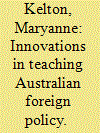|
|
|
Sort Order |
|
|
|
Items / Page
|
|
|
|
|
|
|
| Srl | Item |
| 1 |
ID:
167129


|
|
|
|
|
| Summary/Abstract |
Greater uncertainty characterizes Australia's strategic environment. Power transitions in the Indo-Pacific test US primacy at a time when Australia as a major US alliance partner is encountering new asymmetric, society-centric threats from state and non-state actors in what is called the ‘cognitive battlespace’. This is a different kind of warfare, utilizing information as military force. Threats take the form of direct manipulation of interconnected, information-rich environments. Securing the national interest from society-centric threats involving the ‘weaponization of information’, especially of social media and the global corporate platforms upon which they operate, poses considerable strategic, conceptual and technological challenges for Australia's civilian and military cyber-defence agencies. We begin by briefly reviewing the evolution of the strategic culture underpinning Australia's understanding and use of military force, arguing that it is shaped largely by historical insecurity borne from a deeply embedded social sense of isolation and an unquestioned strategic imperative to rely on alliances with ‘great and powerful friends’. We give a brief account of Australia's ‘last wars’ which saw it deploy to Afghanistan, Iraq and Syria and note the evolving cyber-enabled changes to the battlefield. We then argue that the new cyber-threats target the domestic fabric of liberal democracies and market economies, posing risks to all military and civilian institutions as well as weakening citizens' belief in the values which underpin them. Finally, we examine Australia's evolving integration with US networked cyber capabilities, and legislative and bureaucratic reforms to counter foreign political interference campaigns, asking whether they are sufficient.
|
|
|
|
|
|
|
|
|
|
|
|
|
|
|
|
| 2 |
ID:
170408


|
|
|
|
|
| Summary/Abstract |
More than ever as the uncertainties of a digitalised world are upon us and where power shifts to and within the region disrupt the familiar patterns of engagement, the acquisition of the knowledge and competencies necessary for Australia to be a trusted international partner are pressing matters. So too, in the development of both personal and professional skills, our pedagogic remit to students guides us to assist them in learning more about themselves in the process. How, then, should we teach Australian foreign policy and in doing so grow the conjunctive tissue of student self-learning in order to prepare students for the world of diplomacy necessitated by Australia's international workspace? Here, experiential learning can have a powerful effect in the teaching of Australian foreign policy and in the development of students' life and professional skills. Both in-person simulations situated within the context of a thoughtful curriculum, and short-term international mobility study tours can contribute to an effective mix of learning experiences and assist us in moving closer toward effective practice in the current uncertainties and an era of digital transformation.
|
|
|
|
|
|
|
|
|
|
|
|
|
|
|
|
| 3 |
ID:
069696


|
|
|
| 4 |
ID:
081495


|
|
|
|
|
| Publication |
2008.
|
| Summary/Abstract |
Linkage politics in the US were revived after the terrorist attacks in 2001 as the US endeavored to bolster its position in the international system. This paper examines current US economic statecraft in East Asia, particularly through the use of the preferential trade agreement instrument. As the US encounters increasing threats in the region through China's economic and military expansion, the emergence of Islamic militancy, and continuing tensions on the Korean peninsula, it is attempting to reinforce its strategic position through the economic reinforcement of its bilateral politico-military alliances. However, as the establishment of its recent free trade agreements has revealed, neo-mercantilist politics, as motivated by US Congressional attention to domestic lobbying, present a risk to this strategy. It is possible that this tendency to economic nationalism, as evidenced in the Australia-US Free Trade Agreement, will detract from the broader purpose of reinforcing the US strategic position in the region.
|
|
|
|
|
|
|
|
|
|
|
|
|
|
|
|
| 5 |
ID:
165214


|
|
|
|
|
| Summary/Abstract |
Since the 1950s, US strategic architecture in the Indo-Pacific has been premised on its hubs-and-spokes model of bilateral alliances and security partnerships. Since the 2000s the US began working toward forging deeper interrelationships between its regional allies and partners. The emerging strategy ultimately aims to interlink long-standing allies like Japan and Australia, and also non-traditional partners in the development of a security network capable of maintaining the regional ‘rules-based order.’ In analysing the US-led triangular Indo-Pacific geometry, this article considers the prospects of an evolving and substantive US–Australia–Indonesia security trilateral. It does so by utilising Miller’s ‘conditions for cooperation framework’ to test the likelihood of greater cooperation between these three states. These conditions include cultural similarity, economic equality, habits of international association, the perception of common danger, and greater power pressure. It concludes that while there remain strict limitations on any formal alignment between the ANZUS partners and Indonesia, there are convergent interests in key sub-strategic areas in the maritime space and thus a viable path toward greater trilateral cooperation but not, as yet, formal arrangements.
|
|
|
|
|
|
|
|
|
|
|
|
|
|
|
|
|
|
|
|
|